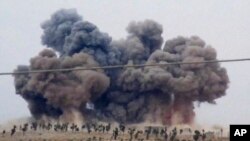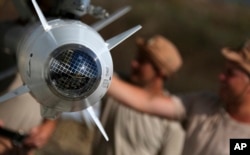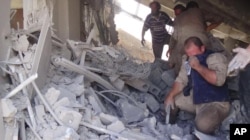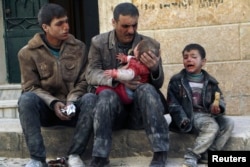As Moscow continues to deny accusations that its air campaign against Syrian rebel forces is causing mass casualties among civilians, some observers in Russia say the country could find itself embroiled in a large-scale international conflict in the Middle East.
On Monday, German Chancellor Angela Merkel strongly criticized Russia's actions in Syria.
"We have been, in the past few days, not just appalled, but horrified by what has been caused in the way of human suffering for tens of thousands of people by bombing. Bombing primarily from the Russian side," she said after meeting with Turkish Prime Minister Ahmet Davutoglu in Ankara.
Human Rights Watch alleges that the joint Syrian government-Russian military operation against rebels in Syria had employed internationally banned cluster munitions in attacks since January 26. Those attacks, it said, killed at least 37 civilians, including six women and nine children, and wounded dozens.
The New York-based group noted that the Syrian government-Russian military operation targeting the rebel stronghold of Aleppo has caused at least 20,000 people to flee toward the Turkish border.
Russia: No evidence
On Tuesday, President Vladimir Putin's spokesman, Dmitry Peskov, rejected Merkel's criticism.
"As for the Chancellor's words about the alleged casualties as a result of Russian airstrikes, surely we should pay attention to the fact that, despite the huge number of such statements, thus far nobody has presented a single piece of credible evidence for those words," Peskov said.
Alexander Shumilin is head of the Center for Analysis of Middle East Conflicts at the Institute for U.S. and Canada Studies in Moscow.
He said the joint Syrian government-Russian military offensive was deliberately ramped up just as U.N.-mediated peace talks were set to start, and as the International Syria Support Group prepared to meet in Geneva in the search for a political solution.
"The [Russian air force] operation was very carefully calculated, and the latest offensive actions [by the Syrian army] were undertaken at the moment of preparations for negotiations and the start of the conference in Geneva," he told VOA.
Shumilin believes Syrian President Bashar al-Assad's military used the preparations to buy time for its offensive, with the goal of blockading Aleppo and other rebel strongholds.
Tensions escalate
Earlier this month, U.N. special envoy for Syria Staffan De Mistura announced a "temporary pause" in the talks between the Syrian government and the moderate opposition, after the latter complained about the relentless bombardment by the Russian air force and Syrian army.
Shumilin said Moscow seems "little worried" by international reaction to its intensified bombing campaign.
Meanwhile, tensions between Russia and Turkey, already high after Turkey's air force shot down a Russian warplane it says violated its airspace from Syria, have escalated.
Turkey's Hurriyet newspaper quoted Turkish President Recep Tayyip Erdogan last week as calling Putin an "occupier" in Syria, a charge Kremlin spokesman Peskov dismissed as "absurd."
On Tuesday, Turkish Prime Minister Ahmet Davutoglu warned Moscow its forces in Syria would face the same kind of defeat that Soviet forces suffered in Afghanistan in the 1980s.
"Nobody should forget how the Soviet forces, which were a mighty, super force during the Cold War and entered into Afghanistan, left Afghanistan in a servile situation," Davutoglu said. "Those who have entered Syria today will also leave Syria in a servile way."
Davutoglu has called for a no-fly zone in Syria "so that Aleppo will be protected, at least against the air bombardment."
‘Unexpected’ actions
Irina Zvyagelskaya, a senior research fellow at the Russian Academy of Sciences' Institute of Oriental Studies, told VOA that Turkish leadership has shown it is ready to take "completely unexpected and not always calculated actions, especially in regard to Syria and Turkish interests in the region, as they are understood in Ankara."
As examples of "unexpected" Turkish actions, Zvyagelskaya cited Erdogan's reaction to a meeting held last week between U.S. envoy Brett McGurk and members of the Syrian Kurdish People's Protection Units (YPG), in Kobani, the Syrian town once held by IS.
After that meeting, Erdogan aimed a barbed rhetorical question at Washington, asking, "Is it me who is your partner or the terrorists in Kobani?"
Vladimir Ryzhkov, a former Russian parliament member and prominent opposition politician, told Echo of Moscow radio earlier this week that there is a "great risk" fighting in Syria will escalate into a "big world war."
Saudi Arabia, he noted, recently said it is willing to send ground forces into Syria, while "the Turks say that they are ready to enter Syrian territory to protect the population from the advancing army of Bashar al-Assad."
Meanwhile, Russia's air force and Iranian troops are backing Syrian government forces, he said.
"It's a scary and dangerous situation," Ryzhkov said. "We may find ourselves in the situation of a general world war in the Middle East with the participation of Russia."
VOA's Jonas Bernstein contributed to this report from Washington.







